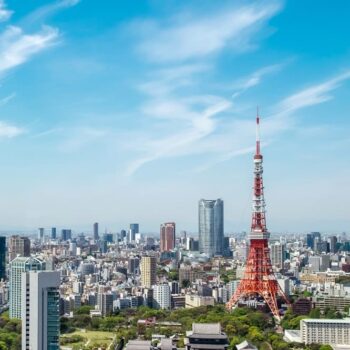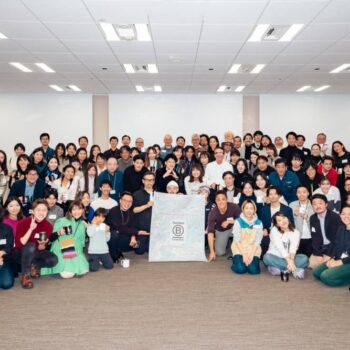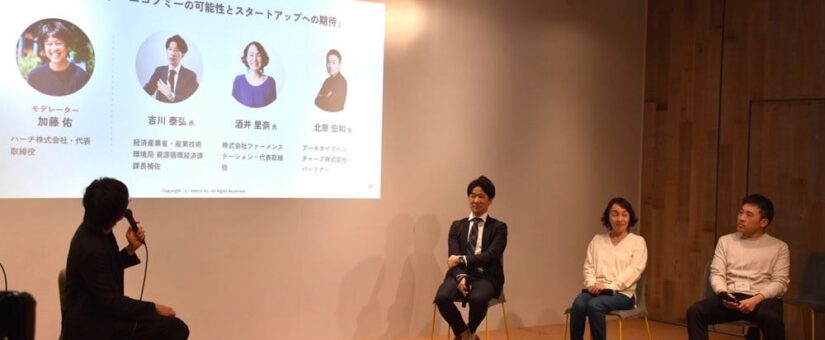
Event report: Briefing session for “CIRCULAR STARTUP TOKYO,” a circular economy startup incubation program
- On Mar 19, 2024
- accelerator, Circular Economy, Circular Economy Hub, CIRCULAR STARTUP TOKYO, event report, incubation, start-up support, startup, Tokyo, TOKYO SUTEAM
On March 7, Harch, the operator of the Circular Economy media platform Circular Economy Hub, held a briefing session for prospective participants of “CIRCULAR STARTUP TOKYO,” a circular economy startup incubation program. The program is implemented in collaboration with the Tokyo Metropolitan Government.
About 100 participants, both on-site and online, gathered at the event. In addition to our sponsor, three guest speakers involved in the CIRCULAR STARTUP program took the stage to give presentations and participate in a panel discussion on their initiatives, challenges for future development, and expectations for the program.
This article reports on guest talks from three different perspectives and a panel discussion featuring Yasuhiro Yoshikawa, Assistant Director of the Resource Recycling Economy Division at the Industrial Science and Technology Policy and Environment Bureau of the Ministry of Economy, Trade and Industry; Rina Sakai, President of Fermenstation Co., Ltd.; and Hirokazu Kitahara, Partner at Archetype Ventures.
*This article is a reprint of the Circular Economy Hub “Creating Circular Startups that ‘Change the World from Tokyo’ [CIRCULAR STARTUP TOKYO Information Session Report].” (in Japanese)
Aiming to create circular startups
Kato, the CEO of our company, who is the organizer of the program, said, “We would like to support those who are trying to create new businesses in the circular economy, an area that the Japanese government will be focusing on in the future, and to create more and more good businesses and practices in the circular economy from this location in Tokyo. This program will be our first challenge, and we hope to make it even better with your feedback,” he said in his opening remarks.
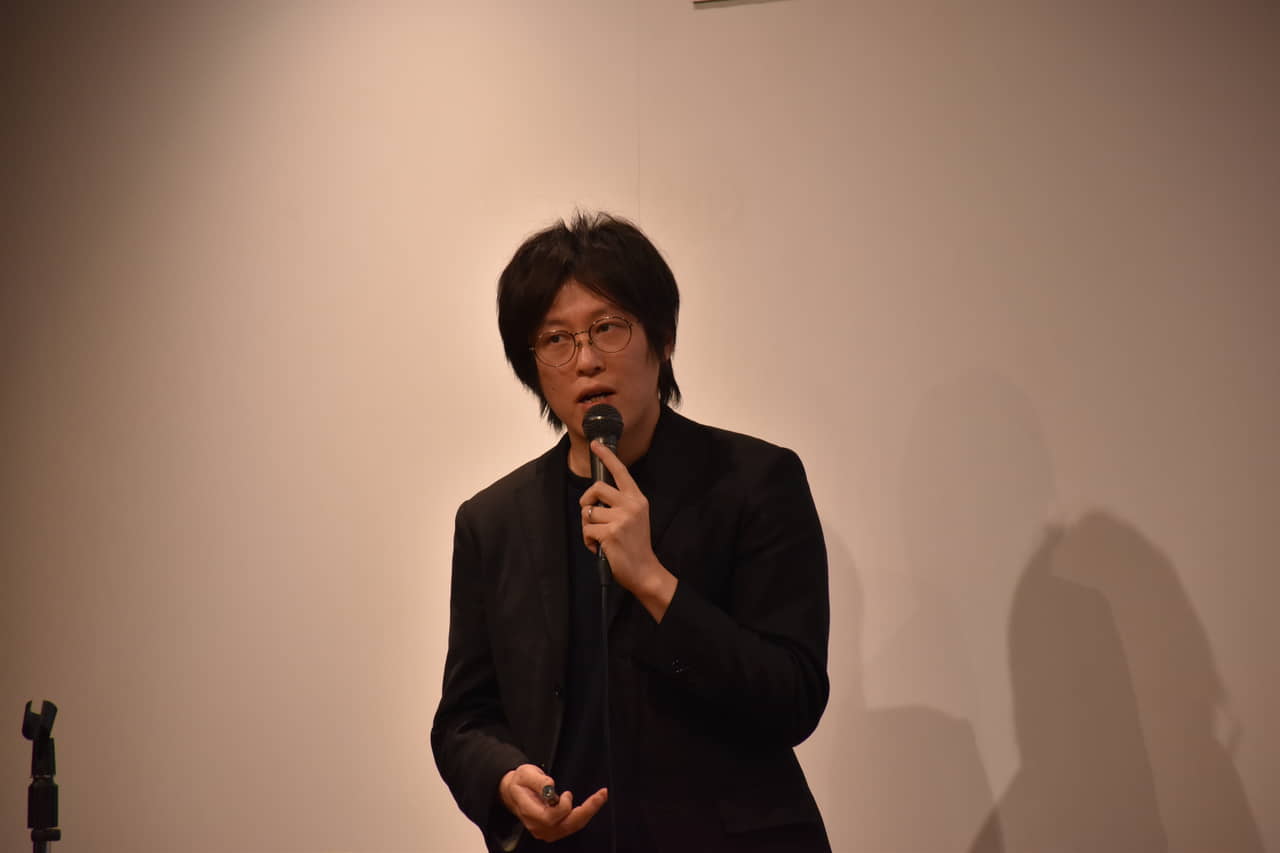
Yu Kato, CEO of Harch Inc.
Kitahara of Archetype Ventures, a member of CIRCULAR STARTUP TOKYO, expressed his enthusiasm for this program, saying, “I would like to make this the beginning of a larger effort to create a layered startup support program for the circular economy in Japan.”
Guest talk from the policy perspective: “Japan’s Circular Economy Policy and Expectations for Startups”
Yoshikawa of the Ministry of Economy, Trade and Industry (METI) gave an explanation of the Circular Economy Policy, which is attracting a great deal of attention from the business community.
He touched on topics such as the evolution of the circular economy policy for resources and the status of waste reduction. He then said, “Until now, efforts have been made from the perspective of the 3Rs (reduce, reuse, and recycle) to address the social issue of the tightness of final disposal sites, but from now on, we need to promote an approach of how to circulate resources and use them in an efficient and cyclical manner. He stressed the significance of the shift to a circular economy.
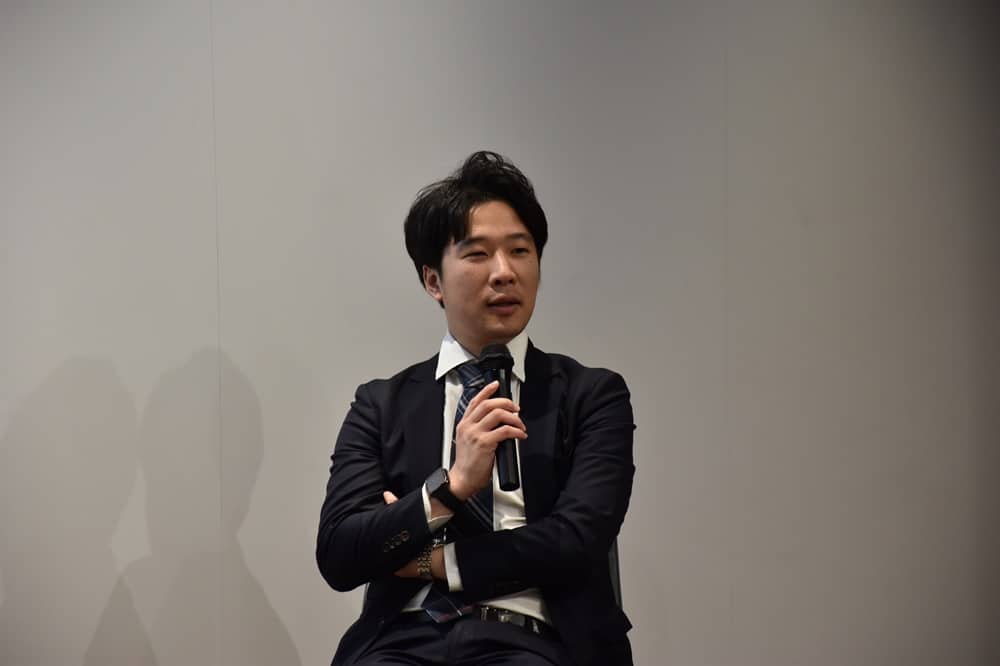
Yasuhiro Yoshikawa, Assistant Director, Resource Recycling Economy Division, Industrial Science and Technology Policy and Environment Bureau, Ministry of Economy, Trade and Industry
“If we continue with the current linear economy system of mass mining, mass production, mass consumption, and mass disposal, the amount of resources mined will increase dramatically in line with population growth, and the Earth’s resources will eventually be depleted. The earth’s resources will eventually be depleted. Japan, in particular, is a resource-poor country compared to other countries, so it is necessary to tackle this issue with a sense of urgency. While we will continue to seek economic indicators, it is crucial to establish a virtuous cycle that promotes resource recycling, essentially decoupling economic growth from the amount of resources invested,” he emphasized strongly.
Regarding this year’s program, he encouraged participants, “As the market size of the circular economy grows on a global scale, we believe that the new businesses that you have gathered here will become a source of significant economic growth in the future.”
He added, “In creating businesses in the circular economy, it is extremely important to find ways to balance economic, environmental, and social aspects. It is difficult for individual entities to do this on their own, but by working in partnership with industry, government, and academia, society as a whole can solve a variety of social issues. It is with this awareness that we launched Circular Partners (CPs) in September of last year.”
“In December last year, the Cabinet approved a plan to invest more than two trillion yen in the resource recycling sector over the next 10 years, and METI hopes to develop policies based on a combination of circular economy and start-up policies,” he concluded.
Guest talk from a practitioner: “Circular Startups in Practice”
Sakai, a former bank employee, started her own company with a desire to do business that would benefit society and the environment.
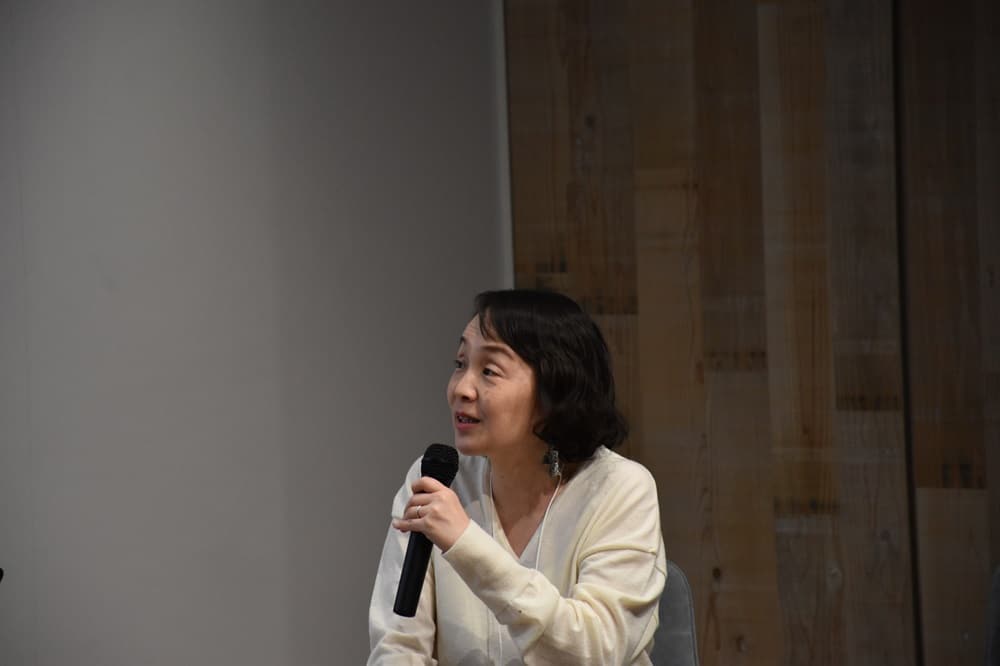
Rina Sakai, President of Fermenstation Co., Ltd.
Fermenstation is a circular startup that produces high value-added biomaterials by combining unused biomass with fermentation upcycling technology. The company has been involved in a number of businesses that transform food residues and unused resources from various companies into products. Currently, the company is starting a new business focusing on R&D and raw materials, and aims to become a top player in the field of petroleum-free and high-performance biomass materials for overseas markets with the goal of global expansion in the future.
Fermenstation has also acquired “B Corp,” an international certification system given to companies that conduct environment- and socially-conscious business in the public interest from the perspective of balancing economic, environmental, and social performance. She also emphasized the importance of enhancing the public interest of circular startups, saying, “If you are going to be in the circular business in the future, I think you will be required to enhance your environmental and social performance, like a B Corp.”
She concluded, “There are still very few startups in the circular economy in Japan. I would like to fight together with more and more people in this area, and I hope that through this program we can increase the number of our friends,” she said, expressing her hopes for the project.
Guest talk from an investor: “The Frontiers of Circular Startup Investment”
Kitahara explained, from a venture capitalist’s perspective, how to scale a business, how circular startups can win in the market, and what exactly they should work on.
“In order to scale a business, simply doing a circular economy business is not enough, it is necessary to increase the resolution from there. It is important not to start a business simply because it is good for society or because it is viable, but to start at a time when all the parts, technology, society, consumers, etc., are well aligned.”
He added, “The circular economy is a situation in which the environment for working on the technological and social aspects is being prepared, but it has not yet penetrated into our lives and consumption. If it is difficult in the BtoC domain, how about in the BtoB domain, for example, or by narrowing down the industry, etc. It is important to find an area that is close to the inflection point.
In Japan, I feel that there are many cases where people fail when they enter the market with the circular economy at the forefront, so it is better to enter the market from the point where consumers feel value and incorporate the idea and elements of the circular economy into products and businesses,” he said. He also discussed overseas examples.
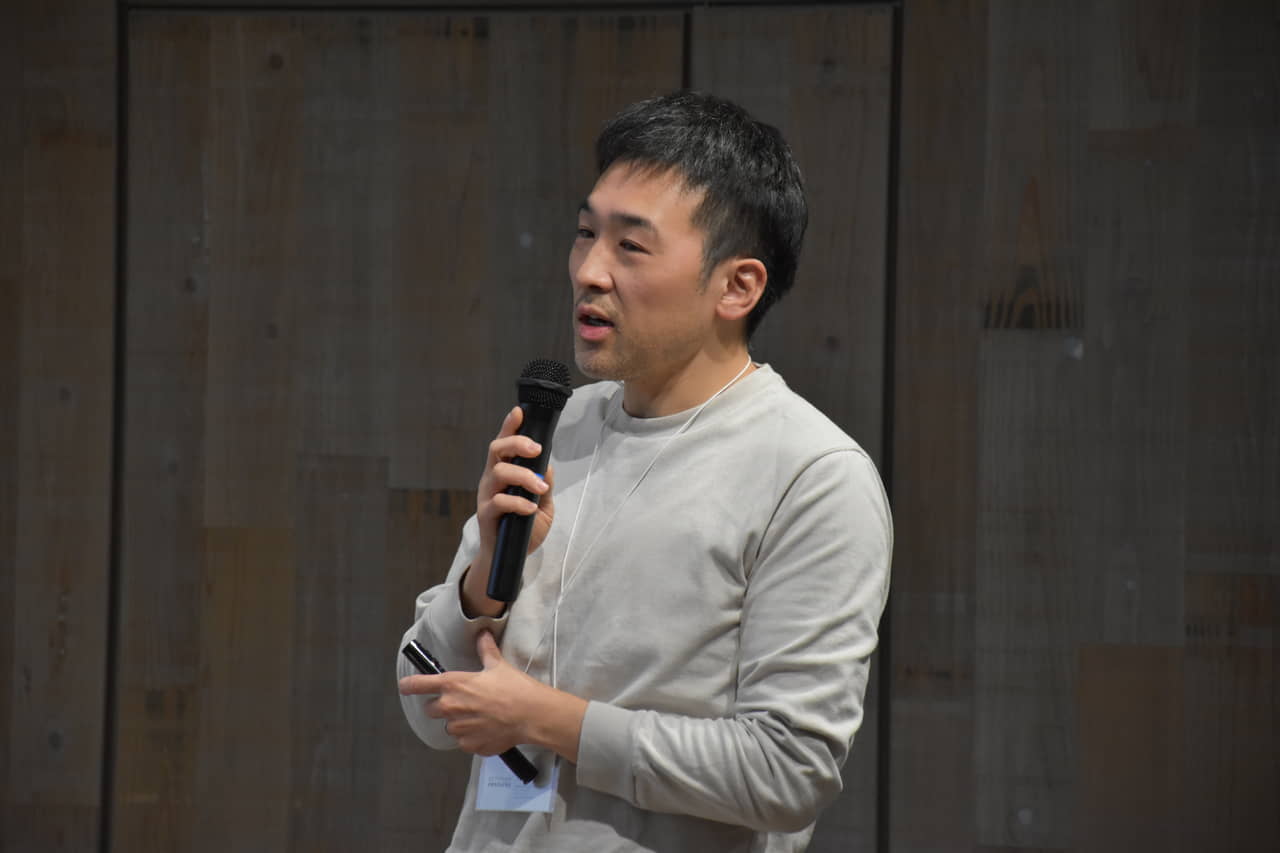
Hirokazu Kitahara, Partner, Archetype Ventures
Regarding this program, Kitahara said, “In order to make a large social impact through business, I would like to see companies pursue scale with high aspirations, rather than simply working to solve immediate problems or to make an economic impact. I hope that this program will convey this point as well,” he said, expressing his hopes and outlook for the future.
Panel discussion: “The Potential of the Circular Economy and Expectations for Startups”
In the panel discussion that followed, guest speakers Yasuhiro Yoshikawa, Rina Sakai, and Hirokazu Kitahara, along with facilitator Yu Kato, discussed the theme of “The Potential of the Circular Economy and Expectations for Startups.”
Regarding expectations for startups, Yoshikawa said, “I believe that a cross-fertilization of fields such as the circular economy, carbon neutrality, and green tech will become one of the cornerstones of industrial policy in the future.”
He added, “In particular, we are talking about green, digital, and economic security, as well as human resources and startups as social infrastructure, as a new axis of economic and industrial policy. So we would be very happy if we can create a cross-fertilization of these issues right here in Tokyo.
We believe that in the future we should also support startups in the area of startups and green businesses. If they can do business while firmly incorporating green tech into the context of the circular economy, a very good ecosystem will be created. I believe that it is you, the people gathered here today, who will create such a new business model.
The government will continue to develop an environment in which you can freely come up with new ideas that we would never have thought of, and link them to business startups. I hope that you will take this as an opportunity to apply for and participate in the program.”
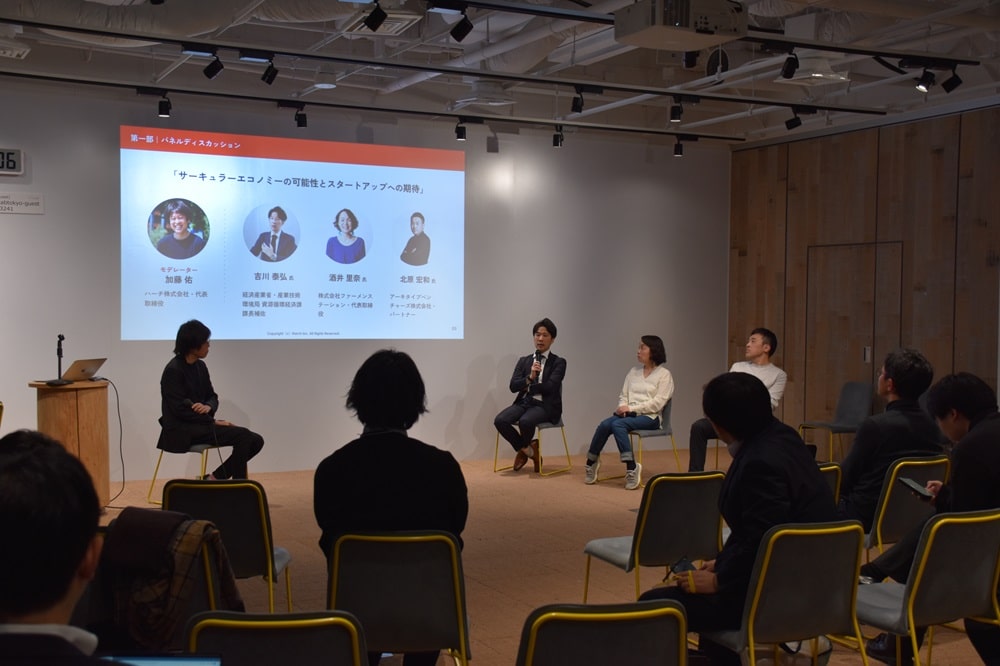
Panel discussion
In terms of the potential of the circular economy, Sakai said, “After listening to the two of you, I once again feel that this is a real business opportunity, and I also feel that there is great potential for Fermenstation.” As for the key to scaling up the business, she said, “We are looking for companies that are thinking about the same thing as we are, and together we will create a market. If we can prove to the world that we can build a business and make money together, I think other people will come on board.”
Regarding his expectations for the circular economy from his perspective as an investor, Kitahara said, “I mentioned earlier that consumers are not yet following the products and services of the circular economy, but that is also an opportunity. If you start your business a little ahead of others, you may be able to beat those who are more capable than you. (Startups) are not a school test, so we are not talking about everyone starting at the same time and answering in 60 minutes; you can run ahead. From that perspective, now is a very good time.”
He added, “In terms of what kind of startups you would want to invest in as an investor or not, it is important to ask, ‘Why are you the one to do that business?’ is also important. Anyone can come up with a business idea after a little study. When an idea is in the right strike zone and we feel that ‘this company can go the furthest and fastest,’ we want to invest in it.”
On the other hand, “I would also like to take this opportunity to tell you that you should not listen too much to what investors say. After all, at the end of the day, it all comes down to whether you can do it or not, and whether you want to do it or not. Therefore, I am sure that people around you will say many things about the business, but you should listen to what you need to listen to and not to what you don’t need to listen to. I want you to do your best in areas where you are strongly committed and able to do your best,” he said.
Lastly, Yoshikawa addressed the prospective participants of the program, “If there is anything that you feel in the field that needs to be addressed by us in order for circular economy businesses to flourish, such as a system or environment, we would like to know about it. The government would like to give serious consideration to this issue. Also, if you would like to form partnerships with other stakeholders, we may be able to be of assistance to you through the Circular Partners framework.
We support your challenges, and we want to keep the winds of the circular economy blowing so that you can successfully ride the tailwind,” he said, calling for broad participation.
About the CIRCULAR STARTUP TOKYO program
Program outline
- Program name: CIRCULAR STARTUP TOKYO
- Period: Tuesday, April 16, 2024 – Saturday, August 3, 2024
- Contents:
- Incubation (4 kick-off and incubation lectures)
- Mentoring (exclusive mentoring, specialist mentoring, secretariat mentoring)
- Demo Day (interim and final)
- Number of applicants: 10 groups (20 people, maximum 2 people per group)
- Eligibility:
- Those who are considering establishing a business in the field of circular economy in Tokyo.
- In principle, participants must be able to attend all programs.
- If participating as a group, a maximum of two participants per group are allowed.
- Application period: Wednesday, February 21, 2024 – Friday, March 15, 2024
- Screening method: Document screening and interviews
- Operating company: Harch Inc.
Eligible participants
- Individuals who are considering establishing a business in the circular economy field (manufacturing, fashion, food, architecture, packaging, digital, etc.)
- Undergraduate and graduate students who wish to commercialize their research
- Internal entrepreneurs (intrapreneurs) belonging to large companies who are considering new businesses in the field of circular economy
- Small and medium business owners who are considering establishing a new company in the field of circular economy
- Start-up business owners who want to start a business in the circular economy field and aim for full-scale business expansion on the premise of raising funds.
Benefits for participants
- Circular Economy Hub Community membership privileges (equivalent to 2,980 yen/month) during the program participation period
- Up to 200,000 yen subsidy per team for prototyping and demonstration testing (application required)
- Fastest matching with domestic and international circular economy investors, large corporations, researchers, and experts according to the challenges and phases of your business
- Introduction to PoC fields, retail and commercial facilities that can cooperate with the demonstration experiment, and municipalities that are proactive in attracting circular startups
- Timely provision of information on grants and subsidies related to the circular economy.
[Reference] Harch launches “CIRCULAR STARTUP TOKYO,” a startup foundation support program specializing in the Circular Economy, in Tokyo on 4/16 | Circular Economy Hub (in Japanese)
[Related Site] CIRCULAR STARTUP TOKYO (in Japanese)
[Related Site] Circular Economy Hub (in Japanese)






